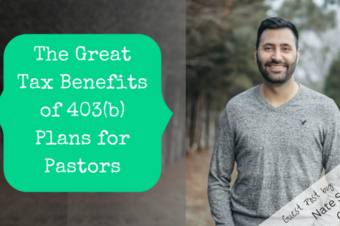I recently received an email from a pastor’s wife of 15 years asking for clarification on how their taxes were paid. She was too embarrassed to ask their tax preparer after all this time, so I was a safe place to turn. (If you have any questions, no matter how dumb you may think they are, I’d be happy to help!)
She felt dumb asking, but it was unwarranted. Taxes for pastors are unusual and it’s very rare for someone to actually explain them to you when you enter the ministry. It took me a while to figure out how they all work, so I don’t fault anyone else for not knowing.
Today we are going to go over the three different options that pastors have for paying their taxes.
Five Facts About Ministerial Taxation
Before we get too far in, though, we need to lay the foundation for what we are going to be talking about. There are some basic facts that you need to understand about taxes for pastors before we get into how to pay them.
Pastors Are Dual Status Taxpayers
First, all “ministers” by the IRS definition are dual status taxpayers. That means that you pay income taxes as an employee but pay payroll taxes (Social Security and Medicare taxes) as if you were self-employed. Self-employed people pay these taxes under the SECA system. ALL ministers pay under the SECA system, it is not optional.
Churches Cannot Withhold SECA Taxes For Pastors
Second, churches are not allowed to withhold SECA taxes for pastors. Neither the pastor or the church has any say in the matter, that’s just the way it is. If a church withholds SECA taxes, it can mess up the pastor’s records with the Social Security Administration.
Churches Can Withhold Income Taxes For Pastors
Third, unlike SECA taxes, churches have the option to withhold income taxes for pastors. It is not required. Every other employer is required by law to withhold income taxes for their employees, but pastors are exempt from that. So, churches don’t have to withhold income taxes for their pastors but they can.
We Have A Pay-As-You-Go Tax System
Fourth, the US tax system is a pay-as-you-go system. That’s why we have employer withholdings. The IRS doesn’t want to wait until the end of the year to get your tax money. They want a little bit from every paycheck.
For self-employed people who don’t receive paychecks (and pastors who are treated as self-employed), that means they have to pay quarterly estimated payments four times a year. You do your own calculations for the amount that you pay quarterly, but if you don’t pay enough and have a big tax bill at the end of the year you can be penalized by the IRS.
SECA And Income Taxes Are Combined On Your Tax Return
Finally, when you file your tax return all of your taxes are lumped into one final bill. You calculate your income taxes and SECA taxes separately but then add them together. If you end up owing, you don’t write one check for SECA taxes and one for income taxes. If you get a refund, you don’t get two separate checks for each kind of tax. It all gets added together on your tax return.
In light of those five facts, these are the options that ministers have for paying their taxes:
Option #1: Quarterly Estimated Payments
Your first option is to handle everything on your own. Your church withholds nothing and pays you your full salary. Then you calculate your expected tax liability (both income and SECA taxes) each quarter and pay your estimated taxes. At the end of the year, you file your tax return to see how accurate your estimates were and either get a refund or owe a little bit more.
Option #2: Quarterly Estimated Payments & Employer Withholding
The second option is to split the responsibility with your church. You have them withhold income taxes from your paycheck and you handle the SECA taxes on your own. You calculate your expected SECA taxes quarterly and pay them. Then, at the end of the year, you file your tax return and make sure to count the taxes that your employer withheld and the estimated payments you made when determining if you get a refund or owe more.
Option #3: Only Employer Withholding
The third option is to have your church withhold all of the taxes you will need to pay. Wait, what happened to “churches can’t pay SECA taxes for ministers?” It still applies. Your church can withhold all of the taxes that you will need to pay if they are all labeled as income taxes, not SECA taxes. For example, if your SECA taxes from every paycheck would be $150 and your federal income taxes from each paycheck are $150, you can have your church withhold $300 for income taxes from each paycheck.
That way, you know that the IRS is happily getting everything they need on a regular basis, even though it is mislabeled. At the end of the year when you file your tax return, it will look like you overpaid income taxes and underpaid SECA taxes but it will all even out. Remember, in the end, they are lumped together for one tax bill. As long as you paid enough and don’t end up owing a lot, the IRS doesn’t mind.
There you have it, the three different options that pastors have for paying their taxes. If you want to do options #2 or #3, you’ll have to make sure that your church is willing to cooperate. And, as you file your tax return this year, make sure that anyone who is helping you understands ministerial taxes because not all paid preparers do!













